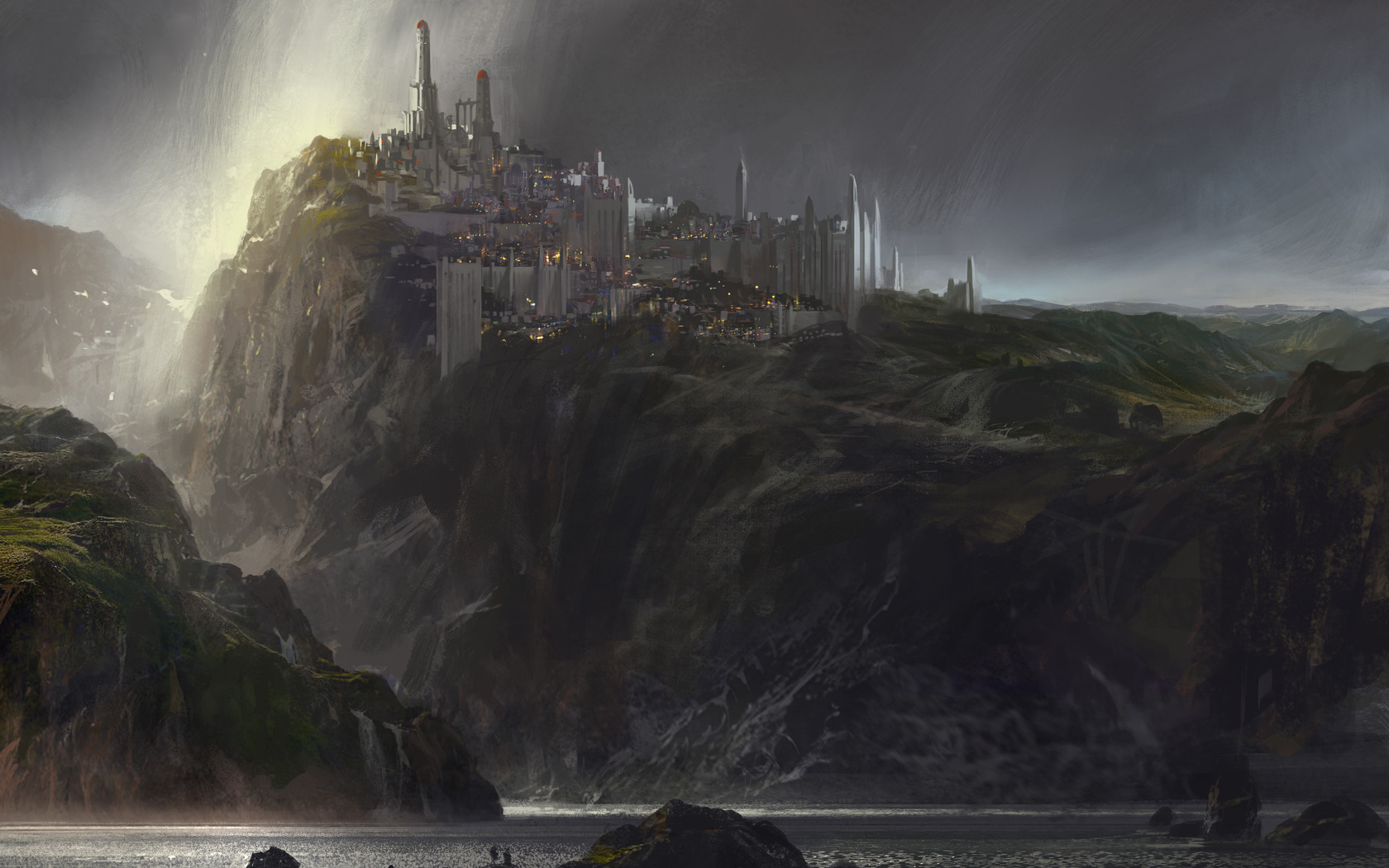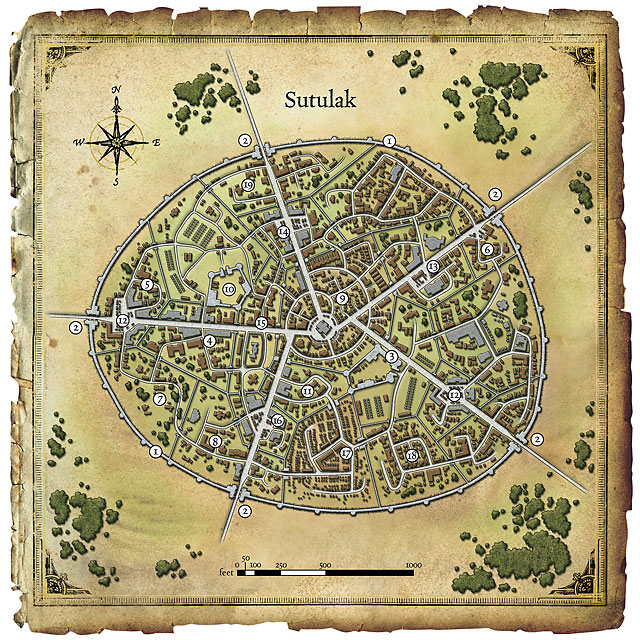The Free Cities (Dominaria Supplement)
Venicia[edit]
Venicia was once the crown jewel of the Arcadian Empire. It was an expansive city built on the perfect deep-water port, it could field three legions on its own, and it could eventually boast the only city proconsul outside Arcadia itself. The city’s leaders though, were not satisfied with their position. Arcadia’s taxes began to bite a bit deeper in the mid-2nd Age, and when all three legions were committed to the losing effort against Grand Caliph Suzerain the city’s leaders decided enough was enough.
In the aftermath of the war the city, then on the border of Arcadia and the un-governed Ramosian Crescent (Andor), declared its independence from Arcadia. Venicia’s proconsul became the governor and the magistrate (head mage in an Arcadian city) became his advisor. The city's fortunes have waxed and waned since then, but it has prospered immensely in the late 3rd and 4th Age. Its vast wealth and trade connections dwarf its competitors and made it immune to attack. The few times in history it has been attacked – twice by Arcadia, once by Orcs, and twice by pirate coalitions – its immense walls and legions of troops have served it well; the city has never once been breached. Its real power is in the banks however, all three of the most powerful banks in the west base themselves in the independent city.
Currently Venicia is incredibly powerful. Its population equals that of any other single country of the west and its grand stadium and hippodrome could seat an entire city elsewhere. Hundreds of ships per day enter and leave its port, and caravans never cease passing through its gates. Now that the great cities of Cormyr and Illyria lie in ruins Venicia is the center of learning and culture – in the arts, sciences, and magic – west of Arcadia. The city is divided into five areas: the dock quarter, the merchant quarter, the Arcadian Quarter, the outer quarter, and the river district. Each of the five is large enough to be its own city and boasts sights and opportunities every day most cities could not offer in a year.
The people of Venicia are remarkably cosmopolitan and the average citizen would make any village mayor look like an idiot in terms of culture and world knowledge. Men from every corner of Dominaria pass through its ports as well as Evles and other denizens unseen in the interior of the West. Dwarves too make the trek south to trade in the open air markets and columned malls of the city. Information is sold alongside goods from all over the world and in the upper echelons magic and secrets trade hand alongside the arcane. The city is warm almost all year round, hot in the summer and slightly chilly and rainy in the winter. Come what may though the city never sleeps, adventure waits around every corner and opportunity knocks on every door.
Rishdan[edit]
The sprawling trade city of Rishdan lies on the slopes surrounding the bay it is named for, an azure expanse of water said to be second to none in beauty. In the waning days of the 1st Age, a young and hungry Arcadian Empire expanded east. Their advance was checked at the Battle of Rishdan Cove when a force of Easterlings far larger than they had supposed existed confronted the 3 Legions of the Legatus Selucius’ Expedition. The two day battle ended Arcadian ambitions to the east and it would be several hundred years before they tried again.
Soon after that battle, Rishdan Cove was settled by the son of a local Emirate who saw the potential of the warm, deep bay. Rishdan the holding grew quickly from a small outpost of 500 men to an imposing castle that sheltered a sprawling port. Within two generations Rishdan was a bustling and prosperous walled city as well as the capital of the expanding Emirate. But in the mid-400s SA the Southern Caliphate began its first expansion and pushed the Emirate’s forces back into Rishdan quickly. The Caliph ordered his men to lay siege to the city and moved on, believing this piece of his expanding puzzle set.
Rishdan however, would not fall easy: its expansive network of trade and allies reaped results immediately. Goods and supplies began to flow in, first bought on Rishdani gold but then on the good credit the city had proven it was good for. Troops came in as well, sent on the promise of future preferred trade, and mercenaries eager for favor or gold. All in all the city held out for a ludicrous three years before the Caliph sought terms and pulled back. The city was pledged immunity from future expansion and was given extraordinary trade rights throughout the Caliphate in return for allowing Caliphi trade through its docks. The Emirate and his family became the Emirs of the powerful city state and the line has ruled, but for a brief coup by the Hashashim, for the Ages since.
By the 4th Age the 'City of One Thousand Towers' is a sprawling metropolis of white buildings, colorful domes, soaring minarets, and plants in striking abundance. Humans from all over Dominaria (Caliphate and Arcadian Empire for the most part but others as well) as well as Elves and denizens of the Najiki Archipelago walk the streets and hawk their wares. Huge ships sailing around Arcadia or north from the Najiki mix with smaller ships from the Sea of Gold (between Arcadia and Concord) or coming west from the islands of the Sea of Storms (Now the Free Concordian Alignment). As cosmopolitan as its twin Venicia, Rishdan’s two ring walls enclose a different animal: a city almost unique in the world that has developed entirely outside the influence of any empire.
Illûna[edit]
(Note: Located just north of the Verge on the west coast.) House Illȗna was once one of the most powerful Houses in the 2nd Imperium. They founded and ruled over Valmorra before joining the 2nd Imperium and rose quickly through the Illyrian social strata. When the Northern Alliance was integrated Illȗna looked to profit immensely through trade through the Alliance to the Sea. Several powerful guilds in Illyria and Cormyr however, had different ideas. These guilds made pacts with other Houses to open markets for northern goods in the interior of the Imperium and then export Imperial goods to the east and south.
Illȗna refused to take the abuse lying down and began ferretting through the back alleys of Imperial politics in an attempt to orchestrate six simultaneous assassinations and a rebellion. On mid-summer’s eve the plan kicked off: at four separate palaces four assassinations succeeded, and in five Houses throughout the Imperium a rebellion began. The rebellion became a full-blown civil war by winter of that year and over the course of the winter the Imperium was forced nearly to its knees. But the geographically distributed nature of the rebels was to be their undoing. Over the next year, four of the rebel Houses were brought to terms and High Seat Illȗna made the decision to evacuate Fal Darra and Ebou Dar and flee north ahead of the Imperial armies.
House Illȗna’s Legions, as well as the rebel armies that managed to consolidate in Illȗna as their Houses surrendered, fought a desperate rearguard as an entire nation fled north by ship and caravan. Over the grueling winter of that year the people made a horrific trek north through The Verge, with only the expectation of more cold and suffering to come. When the Illȗnian people reached the far foothills of the Verge that spring however, a sight far more beautiful than they might have imagined greeted them. Northerned in spring is a truly beautiful place, green as far as the eye can see and nearly untouched by civilization. They founded the city of Illȗna and raised the Swan Banner that day, and haven’t looked back since.
Now one of the few constants in the vast North is the city of Illȗna. Their lands are the only bastion of 'civilization' in the North, albeit surrounded by barbarians and beset by winters those south of The Verge could scarcely comprehend. Illuna's unique mix of Western technology and discipline and Northern size and hardiness has served it well and its people prosper and trade well along the western Imperium. The city itself is beautiful, carved from and sitting atop coastal cliffs the color of rain-filled clouds. Broad planned boulevards and streets crisscross its sloping surface and wide avenues honeycomb the well-lit underground. With the hardened Illunian 'Ice Brigades' (guardians of the border forts), Legions (organized along Imperial lines), and their unique Svarguard (all criminal/volunteer slavery/barbarian auxiliary) their borders and outer towns are kept relatively secure.
Anubrikosh[edit]
Sutulak[edit]
Nestled between the Otarian plains, the barren eastern foothills of the Verge, and the northern Selucian highlands is the city of Sutulak. Traders from Arcadia and Otaria first set up the camp to meet with traders from the nearest dwarven nations and the orcs of Orcinium. The unnamed camp was tough to find and easy to defend, and the difficult road there only made its location better - for the trade there was not quite legal. Traders of ill repute traveled to the camp to exchange wares and buy the exotic substances and items that their dwarven and orcish counterparts had to trade. Word of the camp spread through well established information and illicit good highways throughout the criminal underworld of Arcadia and the East, and within five years the camp became a city. Sutulak, a trilingual bastardization of the human, orc, and dwarven nations the city borders became the name and slavery became the game. With a prime defensible location hidden even from Arcadian and Paladonic scouts, small time trades in narcotics and items dwindled in favor of the highly lucrative slave trade to the Orcs and then east into Sura, Kwazarmia, and to a lesser extent the Southern Caliphate.
As the slave trade grew, the city became increasingly large and organization and crime became a major issue. The city's largest syndicates and merchants knew something had to be done before they lost their business to anarchy or by an organized hit by raiders or the Cabal. They met more for a desire to protect themselves than the city, but when they met they began to move and organize with an alacrity only consummate businessmen can manage. Their first order of business was the formation of a city watch. Formerly many syndicates and merchants had to maintain their own group of guards and many build low walls around their personal camps or pens. They jointly hired 3 mercenary groups at first, but then quickly decided to form their own group with a permanent place and job in the city. So were the Iron Hands formed, the slate-grey wardens of misery in Sutulak. On top of this the city uses its ridiculous affluence to buy one dozen Golems, and keep a Company of The Fists of Hextor on retainer. These 100-150 hardened Knights form the backbone of the city's militant arm.
Within a decade of this act the city dramatically stabilized, crime dropped, and most of the syndicated let their mercenaries go. Soon the city's wealth was such that the impromptu ruling council decided to build the city's formidable walls. 20 ft. tall and 10 ft. wide, featuring five heavy gates portcullised on both sides and boasting 31 reinforced towers, the wall is better suited to a prison or citadel than a large town/small city. Sutulak's wall is one of the most intimidating and disturbing sites in Dominaria as it bristles with glass, wood stakes, and metal spikes and blades on both sides of the wall. The Iron Hands and Fists of Hextor have repelled many raids and all-out attacks from without, but far more slave rebellions within. The gates and imposing gate-forts have never been breached from either side, and enemy soldiers have only set foot on the walls but once - the Children of the Light once attacked the city with 3,500 men and 22 siege engines. The other distinguishing feature of the city are the walls that criss-cross it and divide the city up into sections. These walls, 10-20 ft. tall and 5 ft. wide, are expansions upon the old syndicate walls and serve either to delineate a group's territory or simply to make a district harder to escape from. These days, the ruling council, ever in flux due to changing fortunes and politics, run a fairly well oiled machine. Slaves enter the city from far and wide and leave it into Otaria, Orcinium, or along the Hidden Road east. The citizenry, such as they are, are inured to suffering; and the merchants and syndicate members are even worse. Most commerce within the city is based around the trade, but traders trade in the necessaries for the city's inhabitants and for the men who take the slaves on the long and dangerous roads east or west.
| Dominaria Campaign Settingv | ||||||||
|---|---|---|---|---|---|---|---|---|

|
Players' Handbook | Races, Languages, Classes, Magic, Religion, Literature and Lore | ||||||
| Dominaria Gezeteer | History, Geography, Climate, and Politics, Factions, Calendar and Holidays, Cosmology and the Planes | |||||||
| Dungeon Master's Guide | About, Items of Legend, Bestiary, Consumables, Law in Dominaria, Sample Places, NPCs, Variant Rules, Adding to Dominaria | |||||||
| Geography Subsection | The Westlands, Beldron, Arcadia, The Southern Isles, The Northlands, The Eastlands, Otaria, The Free Cities, The Verge | |||||||
| ||||||||
Back to Main Page → 3.5e Homebrew → Campaign Settings → Dominaria → Geography


